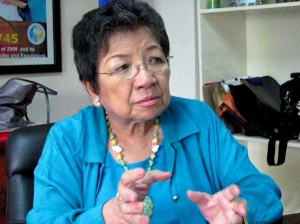CHR report to tackle US role in Mamasapano
LA TRINIDAD, Benguet—A third report on the police operation in Mamasapano, Maguindanao, in January will address the influence foreigners apparently have over the Aquino administration’s campaign against foreign terrorists, according to the country’s top human rights official.
Loretta Ann Rosales, chair of the Commission on Human Rights (CHR), said the commission has pursued an independent investigation into the secret mission to get international terrorists Zulkifli bin Hir (alias Marwan) and Amin Baco, and Filipino bomb maker Basit Usman, on
Jan. 25.
That operation killed Marwan but Usman and Baco escaped. Succeeding firefights, however, led to the death of 44 Special Action Force (SAF) police commandos, 17 Moro Islamic Liberation Front (MILF) fighters and three civilians, including an 8-year-old girl.
Rosales said the CHR report, which would be released later this month, would differ from those of the board of inquiry (BOI) and because it was drawn up “through the lens” of international war crime regulations.
Shared info, equipment
But she said the agency would look into details pointed out by the BOI and the Senate regarding “American influence in the operations on Jan. 25.”
Police officials tasked to coordinate the operation had confirmed that it shared information, training and equipment with the United States, Rosales said, quoting the previous reports.
The CHR report would try to determine “to what extent had American involvement affected the decisions and the behavior [of government officials] at the operational level [of anti-terror missions],” Rosales told the Inquirer shortly after she and CHR officials launched this town’s Human Rights Action Center and Rule of Law.
“When we are talking about cooperation [among countries in order to] address international terrorism, what standards do we follow? We have to have standards,” she said.
She said this should be clearly stipulated and defined in treaties like the Visiting Forces Agreement (VFA).
The American presence has revived questions about the US government’s reported use of drones, Rosales also said.
“We have talked to [Mindanao] residents. When they hear the sound of what could be drones, they get scared because it usually means something bad follows,” she said.
When asked, Rosales acknowledged that her agency’s report may trigger the same political fallout that attended the release of the BOI and Senate reports and the results of investigation conducted by the MILF.
MILF peace talk
“I don’t want to preempt [our] investigation but that (the peace agreement with the MILF) was a major concern. For example, I asked the police yesterday (March 30) why they requested artillery in what should have been a conventional combat operation. And they replied that it was necessary because terrorists wage guerrilla warfare in rebel-controlled territories,” she said.
Rosales said matters involving suspected terrorists should be clarified in the peace negotiations.
Brutality
The report would also address the reported brutality that left many of the slain SAF men mutilated or dismembered following the battle with armed groups in Mamasapano as they tried to leave the area, she said.
She said the CHR has coordinated with the Philippine National Police’s human rights desk, as well as acting PNP chief, Deputy Director General Leonardo Espina Jr., to access autopsy reports and forensic examinations.
Rosales said she offered to help Espina strengthen evidence required when the police build a case against people they believed were responsible for the botched operation, and the death of the policemen.
Rosales tasked lawyer Harold Kub-aron to visit the widows and families of 14 slain SAF members who were from the Cordillera, two of them from La Trinidad town.
